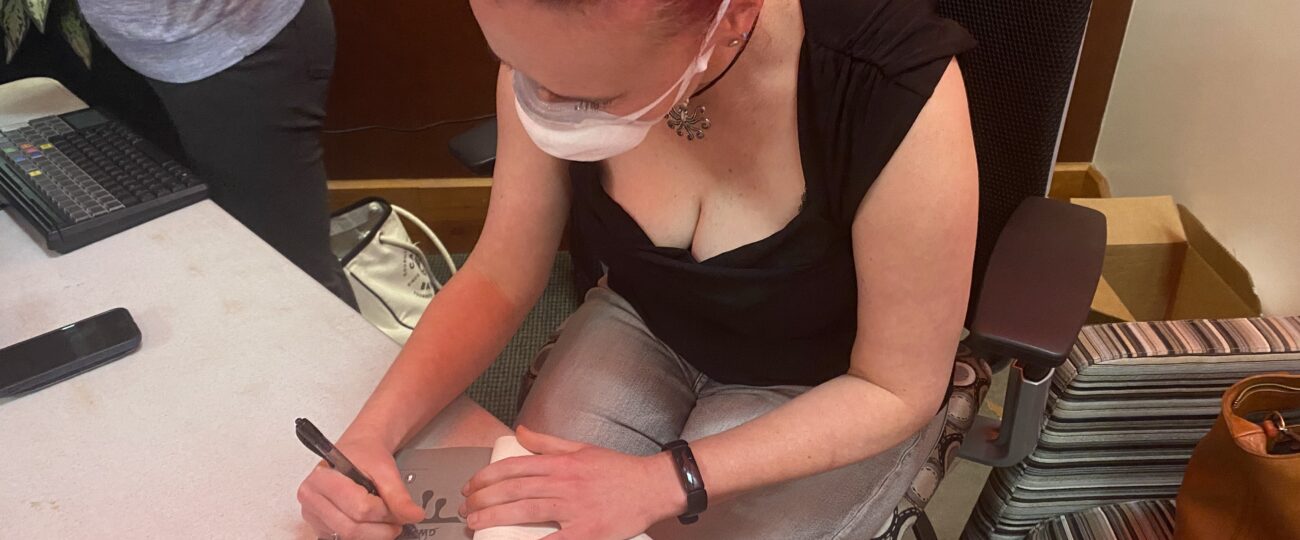Gwen Kirby, an author and creative writing teacher at the University of the South in Sewanee Tennessee, held a reading at Whiton’s Auditorium this past Thursday to read one of the short stories from her debut book “Shit Cassandra Saw.” During this cultural event, students in attendance could ask questions about Kirby’s writing process and for advice.
Kirby spoke about how it was vulnerable and even uncomfortable at times to write about the characters in her book and the hardships they go through.
“It can be uncomfortable and weird for me to write these stories, because I’m not writing about myself. I’m bringing some feelings into my writing, but these characters aren’t me,” Kirby said. “But these stories can talk to other people who have been through these things.”
Kirby shared a short story from her book titled “Marcy Breaks Up With Herself,” which featured a woman having an internal monologue as she tries to reinvent herself after a breakup and discovering her parents are selling her childhood home.
“I wanted to have a space on the page for that internal monologue. I feel like it’s so loud and so present in a lot of people’s lives,” Kirby said. “But it’s also really exciting at the same time.”
When discussing her writing process, Kirby admitted that she does not have a consistent writing schedule, rather, it varies by day.
“It really varies. I’ve always been so envious of those writers who get up like at six am every day and write for three hours,” Kirby said.
“Sometimes I don’t write for a month and I feel guilty about it the whole time. Sometimes I write every day for a couple of weeks, and it’s marvelous, and I think ‘why don’t I just do this all the time?’ And then I don’t do it for another month. So I think that my writing process honestly is very much about just making myself sit down and do it,” she said.
Kirby also discussed the genre of short stories and how it can be frustrating deciding an ending with such limited time with each story.
“I think it’s something that you will often find really frustrating about the genre. I think a short story ends successfully, when the ending addresses the question at the beginning of the story,” Kirby said.
“And for me, the question of the story is, ‘is there some way in which purging herself will make her a new person?’ And of course, the answer is no. But the thing is, we know the answer is no, at the beginning of the story, so the story can’t end with the answer from the beginning. A friend of mine once said these stories’ endings should feel surprising but inevitable, which I think about a lot.”
Gwen Pregnall, a junior English major attended the reading and was excited to meet Kirby. She had been looking forward to the interaction before the cultural event was announced.
“I already had her book before I knew she was coming,” Pregnall said. “It was amazing getting to talk to her and hear her read.”
Pregnall enjoyed meeting Kirby afterward when Kirby was signing copies of her books.
“I loved this event. I think I enjoyed it because there was not much interiority,” Pregnall said. “I learned so much about being a writer and how writing can be a source of joy for the reader and the writers.”
Brianna Kale, another English major, also had a wonderful time at this cultural event.
“I attended this event because I enjoy hearing others read their own work. Meeting an author is always an enjoyable experience,” Kale said. “I hadn’t heard about the author beforehand but I had read some short stories before the event shared with me by Professor Hoffman.”
Kale also resonated with the reading Kirby shared with Winthrop that evening and felt a connection to the characters that Kirby read about.
“I really liked the story. I think it had some powerful themes in it. The messages were strong enough that I bought the book for myself,” Kale said. “I related to some of the characters’ struggles and felt like Kirby had some really uplifting yet realistic ways of showing those struggles.”




